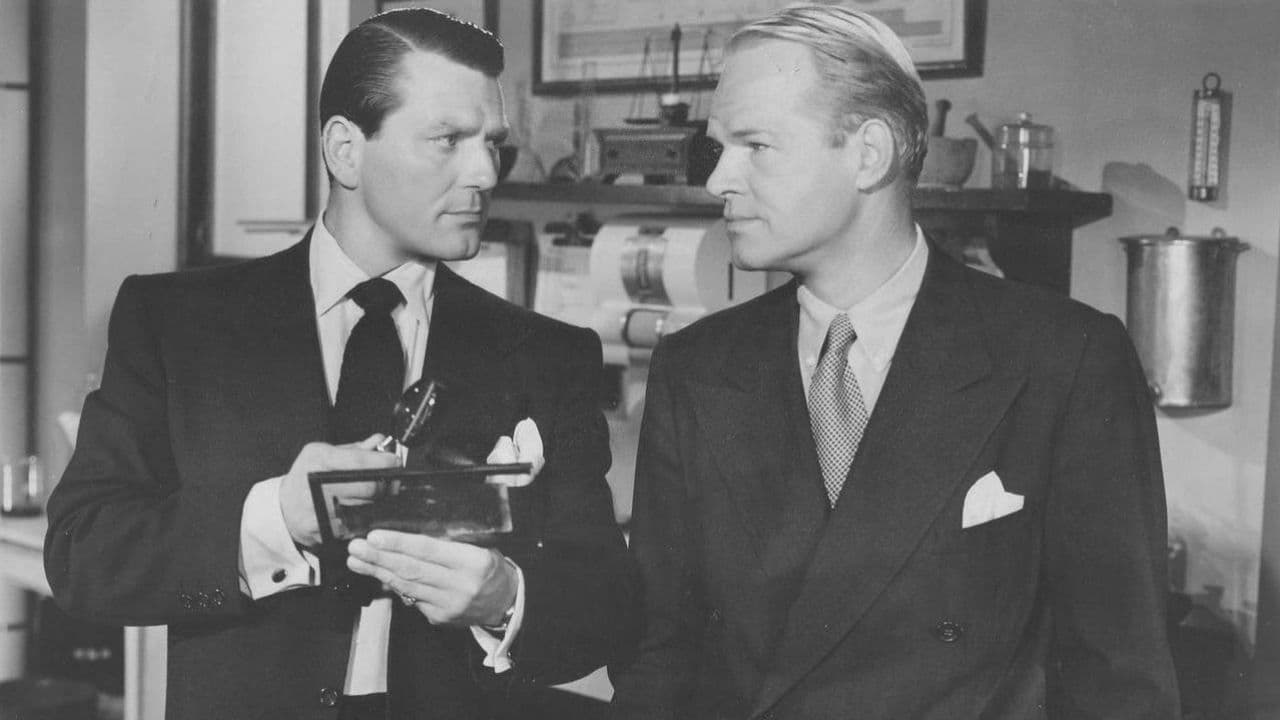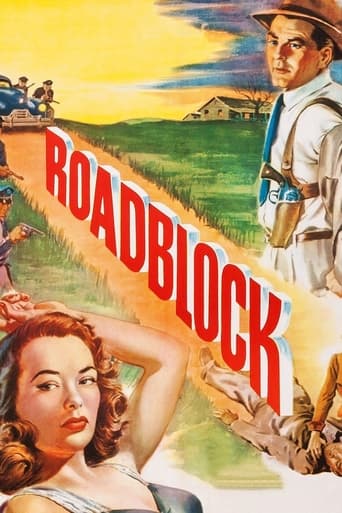

What a waste of my time!!!
... View MoreExcellent, a Must See
... View MoreIt isn't all that great, actually. Really cheesy and very predicable of how certain scenes are gonna turn play out. However, I guess that's the charm of it all, because I would consider this one of my guilty pleasures.
... View MoreIf you're interested in the topic at hand, you should just watch it and judge yourself because the reviews have gone very biased by people that didn't even watch it and just hate (or love) the creator. I liked it, it was well written, narrated, and directed and it was about a topic that interests me.
... View MoreVery entertaining film noir. After the staged 'murder' at the beginning to introduce the protagonist, we get something of a romantic comedy interlude. Then Roadblock deftly switches tracks to a deadly crime drama, thanks to the quick-kindling relationship between Joan Dixon's Diane and Charle's McGraw's Joe.Joe's determination to win Diane at any cost--ethically, morally, and legally, by proposing the heist to Webb--and her realization that she wants him just as he is, shows great plotting and pacing. And plenty of irony. Like other reviewers, I would have liked a bit of backstory on Joe and Diane; their simultaneous value reorientations involve too much suspension of disbelief.It is fascinating to see "Honest Joe" skulking around after the heist, his dream of easy money quickly churning into a noir nightmare. His future narrows down to a hopeless attempt to flee, literally walled in by the river bed's concrete embankments. His love for Diane, which propelled him into the underworld, becomes a crude gesture of raw survival, as he tosses her from his targeted car.Webb's an enigma, an interesting, rational, even perceptive character, who just happens to be a sociopathic criminal. It's a measure of the film's dramatic intensity that we can feel disappointed that Joe ends up being used by Webb, after Joe throws away his initial moral superiority.It's one thing to deal with Joe and Diane's sudden transformations, but some of the plot's logic is suspect as well. It should be obvious to Joe that he's going to be under a spotlight after the railroad heist, as Webb couldn't possibly have come up with the plan without insider help. It might've made more sense for Joe, instead of ignoring Diane's plea to call it off, confesses before it takes place. Then he's guilty of plotting a crime, but nothing happens as Webb and his guys are arrested.Still, Roadblock delivers a slick crime story with strong performances from McGraw and Dixon. A cool, long car chase to finish things up; not to mention the earlier scene as Webb's limo approaches the rendevous with Joe in one car, pulls up in another, and wrecks in a third. And that crash isn't in the mountains where the scene starts, but in the desert. Well, the point is that Webb's toast, in fine low-budget B movie style.
... View MoreAfter an ingeniously twisted opening sequence, "Roadblock" tells the story of an honest man's descent into criminality before ending with a well-staged car chase that concludes at Los Angeles' concrete riverbed. The man's downfall is caused by his obsession with a woman that he wants so badly that he can't think straight but her only interest is in the finer things in life and the money that's needed to buy them.Having successfully recovered a large sum of stolen money that had been insured by their firm, a couple of L.A. insurance investigators decide to head home separately and when one of them, Joe Peters (Charles McGraw), encounters a sexy brunette at the airport, he's immediately attracted to her. Later, he's surprised to find her sitting next to him on the plane and soon discovers that she'd posed as his wife to get her ticket at half price. When their plane has to make an emergency landing because of a storm, they have to share a hotel room for the night and it quickly becomes apparent that Diane Marley (Joan Dixon) is a gold-digger who sneers at Joe's modest salary and says that he's not in her league. When they land in L.A., Diane re-emphasises her lack of interest in Joe and they go their separate ways.Immediately after his return to work, Joe's assigned to investigate a fur-store robbery and when he's shadowing the prime suspect, local racketeer Kendall Webb (Lowell Gilmore), sees that he's accompanied by Diane who's adorned in an expensive fur stole. She's now Webb's mistress and says that she's working as a model. When Joe learns about a shipment of $1,250,000 in old bills that his company is insuring, he presents Kendall Web with a plan for robbing the train that's due to carry the cash from L.A. to San Francisco and agrees to be paid a one-third share of the loot for his part in the caper. During the Christmas holiday period, when Webb leaves Diane on her own while he goes home to visit his family and she spends time alone in a bar where the barman goes into raptures about the pleasures of family life, she has a change of heart and decides she wants to marry Joe, just as he is.Joe discovers it's too late to back out of his involvement in the robbery and after marrying Diane, is on honeymoon in a mountain cabin when the train heist goes ahead. This seems to provide him with a cast-iron alibi, but complications develop when he's assigned to work as part of the team that's brought together to investigate the crime.With its lively pace, hard-boiled dialogue and gripping story about the dangers of giving in to temptation, this highly entertaining thriller is exciting and interesting from start to finish. Despite its low-budget status, "Roadblock" also has a really good cast with Charles McGraw standing out as the tough guy who trades his integrity and so much more to win the woman he desires so powerfully.
... View More'Roadblock (1951)' has plenty of the classic noir ingredients, but it also recalls all those films from which it borrowed them. An honest insurance detective is corrupted into defrauding his own employer – that's straight from 'Double Indemnity (1944).' A swift city-wide dragnet embraces the fleeing anti-hero, stifling his final chance of escape – that's 'High Sierra (1941).' Even leading man Charles McGraw, typically confined to supporting roles, might credibly be described as a "poor man's Kirk Douglas." With his chiselled features and a gravelly voice, I occasionally found myself picturing Douglas in the role (I also saw Gene Tierney in Joan Dixon's place, but that's just me and my wishful imagination). All things considered, the two main performers do quite well in a B-movie that offers few surprises. Content to follow the already-established film noir mould – to drive the riverbed without breaching its banks, so to speak – director Harold Daniels has produced an entertaining, workman-like thriller. But why rewatch it, especially when you can instead enjoy its superior predecessors?The film, intended as the lower half of a double-bill, jumps straight into action. A fugitive bank robber (Peter Brocco) becomes witness to a homicide, the killer taking him hostage and threatening to dispose of him. After offering his stolen loot in exchange for his life, the film pulls its first – and probably only – unexpected twist. The "killer" is, in fact, L.A. insurance detective Joe Peters (Charles McGraw), who engineered the mock murder of his partner (Louis Jean Heydt) to discover the whereabouts of the missing bank money. Peters is fiercely honest, having resigned himself to an unglamorous life on a modest detective's income, but this episode foreshadows his character's transformation into a liar, murderer and fugitive. Why do good men turn bad? In 'Roadblock' – as in all noir – the blame is irrevocably placed on a woman. Unashamed gold-digger Diane (Joan Dixon) taunts Peters with her icy beauty, disdainfully implying that he could never afford somebody like her on such a meagre salary. If you're going to turn to crime, I guess sex is as good a reason as any.'Roadblock' was directed by Harold Daniels, who doesn't appear to have much else of credit to his name, but the cinematography was by Nicholas Musuraca, whose exquisite noirish work is also on display in 'Stranger on the Third Floor (1940),' 'Cat People (1942)' and 'Out of the Past (1947).' What I love most about film noir is how the photography so often suggests more than would otherwise be understood. For example, despite beginning the film as a questionable, if seductive, chiseller, Joan Dixon's character later takes a turn towards the uninteresting, rejecting her former prestigious life-style in favour of love and marriage (making Peters' fatal transformation ironically unnecessary). Having now settled into her new role as a slighted romantic lover, and apparently deserving of our sympathy, Diane witnesses her husband gunned down by police, and resignedly departs the scene. It's not spoken, but Musuraca's camera doesn't forget who's to blame for this tragedy: he frames her strutting purposely - almost dismissively - away from the devastation her hand has caused, like a gunman turning his back on a massacre.
... View MoreThis picture shows just how GOOD an actor Charles McGraw was. The fact that he could get away with some of George Bricker's classic clinkers is testament to his low key but earnest energy. Bricker has stunk up more scripts (SH! THE OCTOPUS, HOUSE OF HORRORS are two of his most notorious) and he doesn't disappoint with ROADBLOCK. Couple Bricker's dialogue with the clumsy direction of Harold Daniels and you have a bunch of actors who are mostly off their game (especially struggling Joan Dixon). The scenario is outstanding and could have been developed into a genuine classic noir. But it turns out pretty routine, even turning the unique idea of a chase in the LA river bed into a pretty tame action sequence. Paul Sawell revives some of his DICK TRACY music for Square Jaw McGraw. Louis Jean Heydt has a larger role than usual and he's quite good, as is Milburn Stone as a Federal Man. Lowell Gilmore is strictly third-rate George Macready. It's a woulda-coulda-shoulda but still a painless way to kill 70 minutes.
... View More